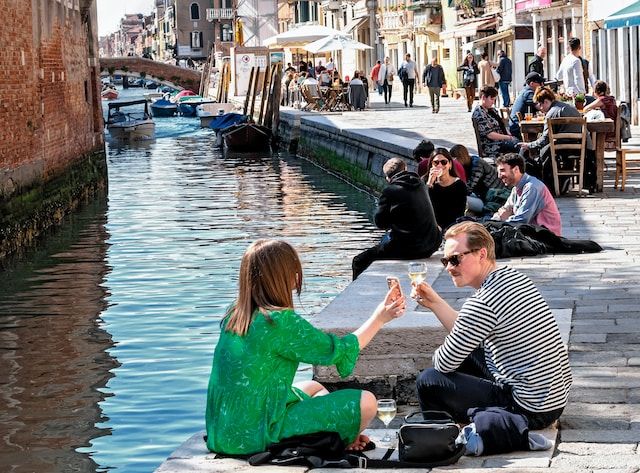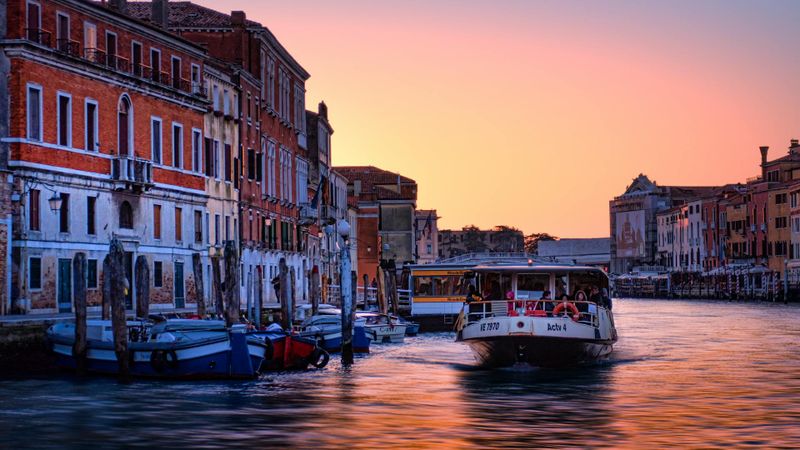The narrow streets of Venice, which weave like golden threads between crystalline canals, hide ancient secrets and traditions rooted in the heart of this unique city.
The Venetians, masters of the art of living well, have built their culture around food and wine, celebrating them with Venetian proverbs and sayings steeped in wisdom, cheerfulness and a hint of mischief.
Through these words, that is, sayings, handed down from generation to generation, we can peer into the deep soul of Venice, discovering its hidden treasures.
Venetian proverbs about wine:

Wine, the elixir of life for Venetians, flows through their veins as abundantly as the water in their canals.
Here are some of the most beloved and quoted proverbs when it comes to this nectar of the gods:
"Meio morir bevui che magnai": This saying, which translated means "Better to die drunk than eaten," celebrates the Venetians' love of wine and its joyful companionship. It is an ode to the philosophy of enjoying the moment without overthinking it.
"A la sera ciochi, a la matina bisi": A playful warning about the consequences of a too cheerful evening. Literally translated, it means "In the evening drunk, in the morning dazed," and reflects Venetian irony and folk wisdom.
"Chi ga inventà el vin, se nol xe in Paradiso, el xe vissìn": This proverb, which translates to "He who invented wine, if he is not in Paradise, he is there by," recognizes wine as having a place of honor in human existence, so much so that it is considered almost divine.
"Quando tuti te dise imbriago, va in leto": Wise advice to avoid trouble during the holidays. This saying, which means "When everyone tells you that you're drunk, you better go to sleep," suggests that it is best to retire when you are already on the edge.
"Cuel que bíu ben, al dorm ben; e cuel que dorm ben, no l fá pecá; ma cuel que no fá pecá, al nda in paradixo: elora beón fin que crepòn": This long and colorful Venetian expression celebrates the joy of life and the lightness of existence. Literally translated, it means "He who drinks well, sleeps well; he who sleeps well does no harm; he who does no harm goes to heaven: and, therefore, let us all drink until we die."
Venetian sayings about food:
Next to wine, food holds a place of honor in Venetian culture.
Here are some sayings that celebrate the pleasures of the table:
"I faxúi e la polenta i é la carne de la dente poareta": This expression, meaning "Beans and polenta are the meat of poor people," extols the simplicity and substance of traditional Venetian dishes.
"Co no guen é pi polenta, le é bone anca le cróstole": An invitation to enjoy what you have without complaining. This saying, which translates to "When there is no more polenta, even the crusts are good," recognizes the value of appreciating the small joys of life.
"Porco passùo no crede a l'afamà": A reminder of the value of appreciating what one has. Literally translated, it means "The well-fed pig does not believe the hungry one," and emphasizes the importance of recognizing one's good fortune.
"Polenta e formái, ma a caxa soa": A reminder to respect traditions and one's intimacy. This saying, which translates to "Polenta and cheese only at home," suggests that certain things should be enjoyed in the warmth of one's own hearth.
"La menestra riscaldada no la é mai bona": A warning against compromises in the quality of life and food. This saying, meaning "Reheated soup is never good," reminds us of the importance of not settling for second-hand choices.
Other funny Venetian sayings:
In addition to food and wine, Venetians have a large collection of sayings that reflect their proverbial cheerfulness:
"Tant maña zhincue que síe": This saying, which translates to "So much is eaten in five than in six," celebrates the generosity and conviviality of Venetians.
"Le disgrazie xe sempre pronte, come le tole dele osterie": An ironic way of facing adversity. This expression, meaning "Misfortunes are always ready, like tables in taverns," emphasizes the importance of facing life with a smile.
"Pitóst crepapanzha que roba vanzha": An invitation not to waste the pleasures of life. This saying, which translates to "Better to eat till you burst than to have leftover food," extols the joy of life and abundance.
"Val depí an ora de alegría que zhento de malinconía": A eulogy to joy and lightness of spirit. This saying, meaning "An hour of joy is worth more than a hundred of melancholy," celebrates the beauty of living fully in the present moment.
"Beati i ultimi se i primi gà creansa": This proverb, which translates to "Blessed are the last, only if the first have compassion on them," reminds us of the importance of compassion and solidarity.
Venetian sayings: conclusion
These Venetian proverbs and sayings are like little jewels set in the fabric of daily life, telling stories of joy, wisdom and humanity.
Through them, we can peer into the authentic soul of Venice, a city where food, wine and good company are always the protagonists, and where life itself is a work of art to be enjoyed slowly, with all the senses.

